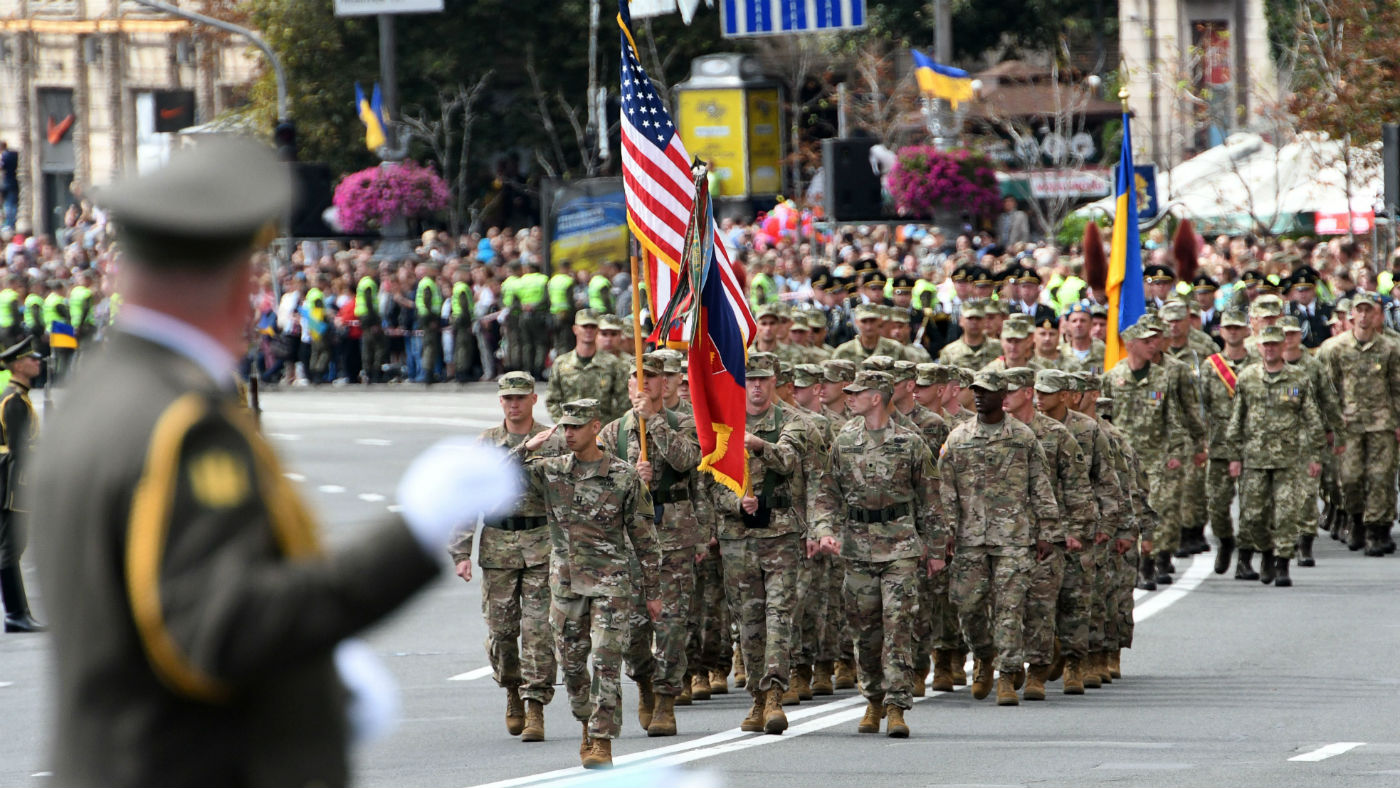Donald Trump 'actively reviewing' whether to arm Ukraine
The US reasserts its support for Kiev ahead of huge Russian military exercises

A free daily email with the biggest news stories of the day – and the best features from TheWeek.com
You are now subscribed
Your newsletter sign-up was successful
The US is considering sending arms to Ukraine after it was revealed at least 3,000 Russian troops are now stationed in the east of the country. Such a move would seriously increase the tension between Washington and Moscow.
Speaking at a joint press conference with Ukrainian President Petro Poroshenko, US Defence Secretary James Mattis said President Donald Trump was "actively reviewing" whether to send lethal weapons and reiterated that the US would stand by Ukraine.
Stopping short of a concrete promise to supply military hardware, Mattis said the US would continue to put pressure on Moscow over "aggressive behaviour" and its failure to abide by the Minsk ceasefire agreement, which was intended to end separatist violence.
The Week
Escape your echo chamber. Get the facts behind the news, plus analysis from multiple perspectives.

Sign up for The Week's Free Newsletters
From our morning news briefing to a weekly Good News Newsletter, get the best of The Week delivered directly to your inbox.
From our morning news briefing to a weekly Good News Newsletter, get the best of The Week delivered directly to your inbox.
"Despite Russia's denials, we know they are seeking to redraw international borders by force, undermining the sovereign and free nations of Europe," Mattis told reporters.
The US has supported Ukraine since a pro-Western government took power after massive street protests in 2014. The resulting conflict between Ukrainian troops and Russian-backed militias led to the formal annexation of Crimea by Russia and the deaths of more than 10,000 people.
Despite repeated requests, the Obama administration shied away from sending weapons to the country, and during the US election campaign last year, Trump "stoked fears in Kiev he might mend ties with Moscow at Ukraine's expense", suggesting Crimea is a legitimate part of Russia, says the Daily Express.
These fears were "heightened following the release of a report which claimed North Korea's recent successful missile tests were only possible with the black market purchase of powerful rocket engines from a Ukrainian factory", the paper adds.
A free daily email with the biggest news stories of the day – and the best features from TheWeek.com
However, if Trump had hoped to mend ties with Russia, "his first few months in office have not seen a rapprochement", says Newsweek.
The latest snub to Russian President Vladimir Putin comes as Russia prepares to mount what could be one of its biggest military exercises since the cold war.
Western officials and analysts estimate that up to 100,000 military personnel could take part in the Zapad (West) 17 exercise, which will take place next month in Belarus, Kaliningrad and Russia. It will be "a display of power that will be watched warily by Nato against a backdrop of east-west tensions", says The Guardian.
Earlier this year, The Independent reported scores of tanks and other US fighting vehicles landed in Germany on their way to take part in Operation Atlantic Resolve, "which foresees the continuous presence of an American armoured brigade combat team in Europe on a nine-month rotational basis".
The mission represents the biggest transfer of American armour to the region since the fall of the Soviet Union, it says, and "was meant to help allay concerns held by Estonia, Latvia, Lithuania, Poland and other Nato allies about Russia".
-
 What to know before filing your own taxes for the first time
What to know before filing your own taxes for the first timethe explainer Tackle this financial milestone with confidence
-
 The biggest box office flops of the 21st century
The biggest box office flops of the 21st centuryin depth Unnecessary remakes and turgid, expensive CGI-fests highlight this list of these most notorious box-office losers
-
 The 10 most infamous abductions in modern history
The 10 most infamous abductions in modern historyin depth The taking of Savannah Guthrie’s mother, Nancy, is the latest in a long string of high-profile kidnappings
-
 Greenland’s capital becomes ground zero for the country’s diplomatic straits
Greenland’s capital becomes ground zero for the country’s diplomatic straitsIN THE SPOTLIGHT A flurry of new consular activity in Nuuk shows how important Greenland has become to Europeans’ anxiety about American imperialism
-
 What happens now that the US-Russia nuclear treaty is expiring?
What happens now that the US-Russia nuclear treaty is expiring?TODAY’S BIG QUESTION Weapons experts worry that the end of the New START treaty marks the beginning of a 21st-century atomic arms race
-
 Epstein files topple law CEO, roil UK government
Epstein files topple law CEO, roil UK governmentSpeed Read Peter Mandelson, Britain’s former ambassador to the US, is caught up in the scandal
-
 Iran and US prepare to meet after skirmishes
Iran and US prepare to meet after skirmishesSpeed Read The incident comes amid heightened tensions in the Middle East
-
 Which way will Trump go on Iran?
Which way will Trump go on Iran?Today’s Big Question Diplomatic talks set to be held in Turkey on Friday, but failure to reach an agreement could have ‘terrible’ global ramifications
-
 Israel retrieves final hostage’s body from Gaza
Israel retrieves final hostage’s body from GazaSpeed Read The 24-year-old police officer was killed during the initial Hamas attack
-
 China’s Xi targets top general in growing purge
China’s Xi targets top general in growing purgeSpeed Read Zhang Youxia is being investigated over ‘grave violations’ of the law
-
 Ukraine, US and Russia: do rare trilateral talks mean peace is possible?
Ukraine, US and Russia: do rare trilateral talks mean peace is possible?Rush to meet signals potential agreement but scepticism of Russian motives remain